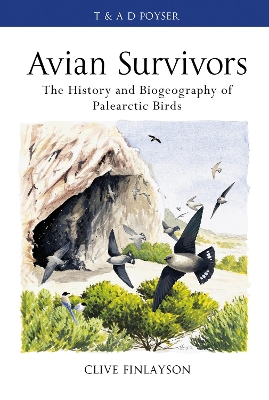Poyser Monographs
2 total works
Using a fresh approach that classifies birds according to their bioclimatic characteristics, Clive Finlayson views the history and distribution of Palearctic birds from a radical new angle.
History and chance events play a central role in a story that has its origins before the asteroid impact that finished off the dinosaurs. In this book, Finlayson shows that the avifauna of the Palearctic long predates the glaciations of the last two million years, and had established itself gradually during the turbulent times of the Miocene and Pliocene, the lifting of Tibet and the drying of the continents having a major influence on these birds.
Those that made it to the start of the glaciations were equipped to deal with whatever the climate could throw at them. They were the avian survivors, and they are still here with us today.
Packed with figures and with a rich colour section, Avian Survivors tells the definitive story of the birds of the Palearctic, across space and time.
History and chance events play a central role in a story that has its origins before the asteroid impact that finished off the dinosaurs. In this book, Finlayson shows that the avifauna of the Palearctic long predates the glaciations of the last two million years, and had established itself gradually during the turbulent times of the Miocene and Pliocene, the lifting of Tibet and the drying of the continents having a major influence on these birds.
Those that made it to the start of the glaciations were equipped to deal with whatever the climate could throw at them. They were the avian survivors, and they are still here with us today.
Packed with figures and with a rich colour section, Avian Survivors tells the definitive story of the birds of the Palearctic, across space and time.
The Strait of Gibralter is famous as a major point of passage for Palaearctic birds migrating between their European breeding grounds and their winter quarters in Africa. Clive Finlayson, a native of the Rock and a trained ornithologist, presents a fascinating account of the region and its resident and transitory bird life. Whether or not you have personally ever witnessed the thousands of raptors, storks and other birds that may make this legendary crossing in a single day, this book will conjure the spirit of this extraordinary place. Delightful illustrations by Ian Willis complete an important and entertaining book. "Finlayson is to be congratulated on the thoroughness of his research, effective graphics production and documentation (over 22 pages of references), all combined in an easily readable book, the whole enhanced by the delightful complementary illustrations of Ian Willis. This is a major work which must have a place in the library of anyone interested in bird migration and/or Iberia." --A.M. Paterson, Ibis

